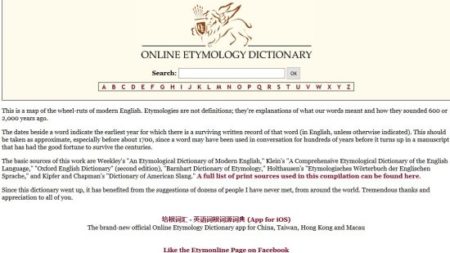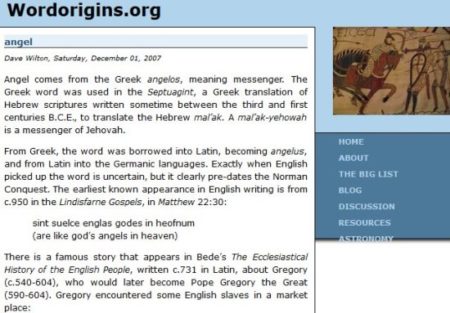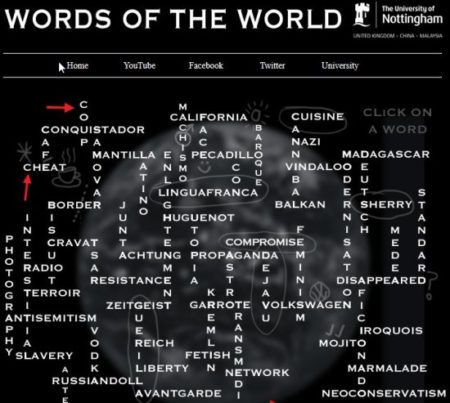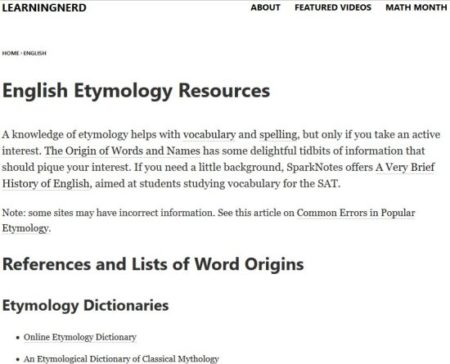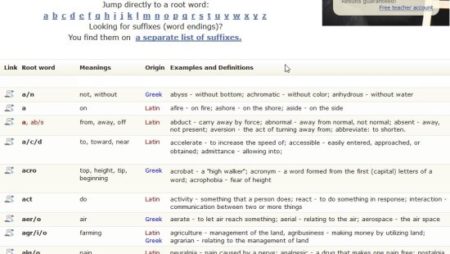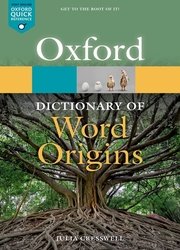We use different languages worldwide to communicate with each other. Every so often we wonder where a word came from. How did a particular word start being used as a common word worldwide and where did it actually originate from. So to find this out we will explore the world of languages and origin of words in this article. This article will cover websites which will let you know the origin of a word.
The study of origin of a word is known as Etymology. You will find that often there are popular tales behind the origin of a word. Most of these tales are just tales and not true, but knowing how the word came into being is equally interesting. So let’s look at these websites to know the origin of words below.
Online Etymology Dictionary
Online etymology dictionary explains you the origin of words and what they meant along with how they would have sounded years back. You would see a date beside each word. This date represents the earliest evidence of this word being used in some sort of written manuscript. Now you can either search for a word you are looking for by typing it in the search box given at the top of the page, otherwise you can browse the words alphabetically. The website has a huge collection of words in it. You can go through the words and find out there origins and meanings as well.
Word Origins by English Oxford Living Dictionaries
Word Origins by English Oxford Living Dictionaries is a good website to know about a words origin. You can check out origin of a word or a phrase. You can search for the word or a phrase you are looking for or can even browse the page to know origin of different words. The website apart from this has a dictionary, thesaurus, grammar helper, etc. As this app has a dictionary, it proves to be a good source for knowing the origin of a word. You can see trending words when you scroll down the page. You can also subscribe to the newsletter on this website to receive updates regarding new words, phrases, etc.
Wordorigins.org
The website Wordorigins.org will let you know the origin of words and phrases. The website has a big list of words which you can go through, or even search for a particular word that you are looking for. The website also has a blog and discussion forum where people can discuss there views. You can login and become a member of the website so you receive regular updates from the website. You can either start browsing words by going to the big list words tab, or by searching for a word. The big list of words is in alphabetical order and there are about 400 words in here. Each word has a interesting story or folklore related to it.
Words of the World
Words of the World is a website which lets you watch videos to let you know the origin of a word. The website explains which language a word originated from through a video. The home page of the website will have a list of words for which you can see a video explaining how the word originated. The words on the home page are given in the format as shown in the screenshot above, but they can also be turned into a neat list if you like. The website is supported by the University of Nottingham and thus is a trusted source.
Learning Nerd
Learning Nerd is another website which has a section on English etymology resources. The website lists references to origin of words like there are word origin dictionaries listed, words with Greek and Latin roots are under a different category, words originating from around the world can be found under international words, and then there is a section for miscellaneous words. You can also play etymology quizzes and listen to etymology podcasts as well. The website itself doesn’t have much information about word origins but will redirect you to another website for your word needs.
Learn That Word
Learn That Word is another website which lists root words and prefixes. The website is pretty basic and a list of words can be seen right on the first page. The words are listed alphabetically, so you can even jump to a word that you are looking for easily. The website will list the root word, its meaning, its place of origin, and then definition and examples. This can be seen in the screenshot above.
These are the websites I found which let you know the origin of a word. Go through them and let me know which one you liked most. If you think there is a website which could be included in this article then leave a comment below.
329
Previews
2
Favorites
DOWNLOAD OPTIONS
No suitable files to display here.
14 day loan required to access EPUB and PDF files.
IN COLLECTIONS
Books to Borrow
Books for People with Print Disabilities
Internet Archive Books
American Libraries
Uploaded by
PhanS
on November 1, 2010
etymology
study of the history of words
Abused, Confused, & Misused Words by Mary Embree Copyright © 2007, 2013 by Mary Embree
et·y·mol·o·gy
(ĕt′ə-mŏl′ə-jē)
n. pl. et·y·mol·o·gies
1. The origin and historical development of a linguistic form as shown by determining its basic elements, earliest known use, and changes in form and meaning, tracing its transmission from one language to another, identifying its cognates in other languages, and reconstructing its ancestral form where possible.
2. The branch of linguistics that deals with etymologies.
[Middle English etimologie, from Old French ethimologie, from Medieval Latin ethimologia, from Latin etymologia, from Greek etumologiā : etumon, true sense of a word; see etymon + -logiā, -logy.]
American Heritage® Dictionary of the English Language, Fifth Edition. Copyright © 2016 by Houghton Mifflin Harcourt Publishing Company. Published by Houghton Mifflin Harcourt Publishing Company. All rights reserved.
etymology
(ˌɛtɪˈmɒlədʒɪ)
n, pl -gies
1. (Linguistics) the study of the sources and development of words and morphemes
2. (Linguistics) an account of the source and development of a word or morpheme
[C14: via Latin from Greek etumologia; see etymon, -logy]
etymological adj
ˌetymoˈlogically adv
ˌetyˈmologist n
Collins English Dictionary – Complete and Unabridged, 12th Edition 2014 © HarperCollins Publishers 1991, 1994, 1998, 2000, 2003, 2006, 2007, 2009, 2011, 2014
et•y•mol•o•gy
(ˌɛt əˈmɒl ə dʒi)
n., pl. -gies.
1. the history of a particular word or element of a word.
2. an account of the origin and development of a word or word element.
3. the study of historical linguistic change, esp. as manifested in individual words.
[1350–1400; Middle English < Latin etymologia < Greek etymología; see etymon, -logy]
et`y•mo•log′i•cal (-məˈlɒdʒ ɪ kəl) adj.
et`y•mo•log′i•cal•ly, adv.
et`y•mol′o•gist, n.
Random House Kernerman Webster’s College Dictionary, © 2010 K Dictionaries Ltd. Copyright 2005, 1997, 1991 by Random House, Inc. All rights reserved.
etymology
the branch of linguistics that studies the origin and history of words. — etymologist, n. — etymologie, etymological, adj.
See also: Language
the study of the origin and history of individual words. — etymologist, n. — etymological, adj.
See also: Linguistics
-Ologies & -Isms. Copyright 2008 The Gale Group, Inc. All rights reserved.
etymology
1. The study of the origins and development of words.
2. The study of the history of words, tracing them back to their earliest recorded forms.
Dictionary of Unfamiliar Words by Diagram Group Copyright © 2008 by Diagram Visual Information Limited
- Top Definitions
- Synonyms
- Quiz
- Related Content
- Examples
- British
This shows grade level based on the word’s complexity.
[ et-uh—mol—uh-jee ]
/ ˌɛt əˈmɒl ə dʒi /
This shows grade level based on the word’s complexity.
noun, plural et·y·mol·o·gies.
the derivation of a word.
a chronological account of the birth and development of a particular word or element of a word, often delineating its spread from one language to another and its evolving changes in form and meaning.
the study of historical linguistic change, especially as manifested in individual words.
QUIZ
CAN YOU ANSWER THESE COMMON GRAMMAR DEBATES?
There are grammar debates that never die; and the ones highlighted in the questions in this quiz are sure to rile everyone up once again. Do you know how to answer the questions that cause some of the greatest grammar debates?
Which sentence is correct?
Origin of etymology
First recorded in 1350–1400; Middle English, from Latin etymologia, from Greek etymología, equivalent to etymológ(os) “studying the true meanings and values of words” (étymo(s) “true” + lógos “word, reason”) + -ia noun suffix; see etymon, -y3
historical usage of etymology
English etymology comes via Old French etimologie, ethimologie from Latin etymologia (which Cicero spells in Greek letters and glosses as veriloquium, Latin for “speaking the truth, conveying the truth”), a loan translation of the Greek etymología “analysis of a word to discover its true meaning.” Etymología is a compound of the neuter noun étymon “true meaning of a word according to its origin” (a neuter noun use of the adjective étymos “true”) and -logía, a Greek combining form used in forming the names of sciences or bodies of knowledge.
Ancient and medieval etymologies are mostly conjectures, puns, or folk etymologies, and are generally wildly incorrect. Cicero, for instance, gives the etymology of Venus (stem Vener- ), the goddess of love, as a derivation of the verb venīre “to come” because love and desire come to all. The most famous etymological howler in Latin is Lūcus a nōn lūcendō “Grove from there being no light,” a pun on lūcus “a clearing, grove” and lūcēre “to shine.” Lūcus a nōn lūcendō first appears in a commentary on the Aeneid by Maurus Servius Honoratus, a grammarian of the late 4th and early 5th centuries.
Common English folk etymologies include cockroach for Spanish cucaracha and chaise lounge for the correct chaise longue. In the case of cockroach, you have the unfamiliar Spanish sounds assimilating with two near-sounding English words, cock and roach. The longue in chaise longue means “long,” but to English readers, looks very close in spelling to lounge, which is a logical use for a chair that is made for reclining on.
Etymology in the sense “the linguistic science that investigates the origins of a word, its relationships with words in other languages, and its historical development in form and meaning” dates from the 1640s.
OTHER WORDS FROM etymology
et·y·mo·log·i·cal [et-uh-muh—loj-i-kuhl], /ˌɛt ə məˈlɒdʒ ɪ kəl/, et·y·mo·log·ic, adjectiveet·y·mo·log·i·cal·ly, adverbet·y·mol·o·gist, nounpseu·do·et·y·mo·log·i·cal, adjective
pseu·do·et·y·mo·log·i·cal·ly, adverbsub·et·y·mol·o·gy, noun, plural sub·et·y·mol·o·gies.un·et·y·mo·log·ic, adjectiveun·et·y·mo·log·i·cal, adjectiveun·et·y·mo·log·i·cal·ly, adverb
WORDS THAT MAY BE CONFUSED WITH etymology
entomology, etymology
Words nearby etymology
ETV, et vir, ety., etym., etymologize, etymology, etymon, e-type, Etzel, Eu, eubacteria
Dictionary.com Unabridged
Based on the Random House Unabridged Dictionary, © Random House, Inc. 2023
Words related to etymology
How to use etymology in a sentence
-
If you sign up, you’ll get a daily notification on your phone to check out a term you may not have heard before and fun facts about the etymology of each.
-
Builder is a word with Old English roots in the ideas “to be, exist, grow,” according to the Online Dictionary of Etymology.
-
I moved to Washington in 1988 with the folk etymology of lobbyist firmly in mind.
-
The Daily Beast reached out to Eschliman to ask about the definition and etymology of the term «Gaystapo.»
-
Its origins and etymology are veiled in mystery: cha is Chinese for “tea,” but debates rage over those first two syllables.
-
Since etymology is epicentral to politics, the new titles that the Republican and Democratic parties choose must be right.
-
He understands this to mean «sheltered, secure from wind;» and he asks to what etymology this sense can be attributed.
-
I would have made the Saracens descend from Sarah; the etymology would then have been neater.
-
No amount of brainwork has conjured any sense from Iffley, and the etymology has been placed on the shelf as “unknown”.
-
In a moment of noteworthy frankness Prof. Skeat has admitted that “Scientific etymology is usually clumsy and frequently wrong”.
-
The official etymology of June is “probably from root of Latin juvenis, junior,” but where is the sense in this?
British Dictionary definitions for etymology
noun plural -gies
the study of the sources and development of words and morphemes
an account of the source and development of a word or morpheme
Derived forms of etymology
etymological (ˌɛtɪməˈlɒdʒɪkəl), adjectiveetymologically, adverbetymologist, noun
Word Origin for etymology
C14: via Latin from Greek etumologia; see etymon, -logy
Collins English Dictionary — Complete & Unabridged 2012 Digital Edition
© William Collins Sons & Co. Ltd. 1979, 1986 © HarperCollins
Publishers 1998, 2000, 2003, 2005, 2006, 2007, 2009, 2012
Название: Oxford Dictionary of Word Origins, 3rd Edition
Автор: Julia Cresswell
Издательство: Oxford University Press
Серия: Oxford Quick Reference
Год: 2021
Страниц: 528
Язык: английский
Формат: True EPUB
Размер: 10.1 MB
Newly updated to incorporate recent additions to the English language, the Oxford Dictionary of Word Origins provides a fascinating exploration of the origins and development of over 3,000 words in the English language. Drawing on Oxford’s unrivalled dictionary research programme and language monitoring it brings to light the intriguing and often unusual stories of some of our most used words and phrases.
The A-Z entries include the first known use of the term along with examples, related lexes, and expressions which uncover the etymological composition of each word. Also featured are 22 special panels that give overviews of broad topic areas, 5 of which are completely new and that variously cover words from Oceania, word blends, eponyms, and acronyms. New findings in the OED since the previous edition have also been added, including emoji, mansplain, meeple, meme, and spam.
An absorbing resource for language students and enthusiasts, but also an intriguing read for any person interested in the development of the English language, and of language development in general. It also includes an extended introduction on the history of the English language.
Скачать Oxford Dictionary of Word Origins, 3rd Edition


